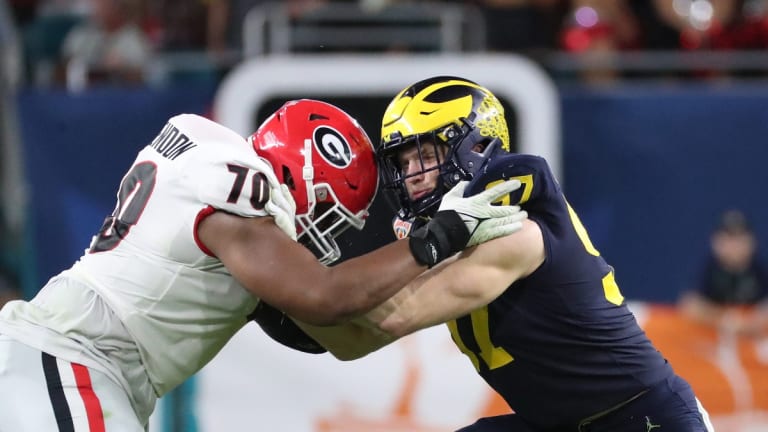
Good for the SEC. For the Rest of College Football, Not So Good.

Remember when you were a kid and darkness was falling on the last night before school started? And you were playing that last game of summer? And you didn’t want it to end?
That was the feeling I had as I watched the wild and crazy Rose Bowl between Utah and Ohio State. That was kind of the last game for me. . . and many other college football watchers north of the Mason-Dixon Line, I suspect.
I know there is a championship game yet to play next Monday. By the time it arrives, I imagine I’ll take a peek. But Georgia and Alabama? That’s like choosing between the measles and the mumps. And it seems like it happens every year around this time.
Yes, they were dominant against Michigan and Cincinnati. The only surprise there: I thought Michigan would hang around and Cincinnati would get crushed, not the other way around. Beyond that, the Southeastern Conference juggernauts delivered on expectations that the semi-finals would be a cakewalk masquerading as a playoff.
Yawn.
What a performance by Georgia. The most dramatic moment of the game came at the end of the half, when Kirby Smart went ballistic on his QB for squandering an opportunity to put one more bootmark on Michigan’s throat.
This will be the 15th time in the last 16 seasons that the national champion comes from the SEC and its Soviet satellite, Clemson.
They may be gobbling that up in the land of barbecue and sweet tea.
But college football’s post-season has turned into a regional sport.
I tend to think that’s bad for any sport. You know that old saying? It’s not a rivalry if one side wins all the time.
That’s what we’ve got going on here.
It’s popular now to romanticize the Ten Year War, when Bo and Woody beat the hell out of each other for a decade. Maybe that was nice for the Big Two. But for those of us in the Little Eight, it was not fun, knowing that we were playing for third place before the season even started.
It also was not good for the Big Ten overall to have programs that weren’t all that interested. The conference got much healthier when Iowa and Illinois and Michigan State broke through and went to Pasadena.
I’m not going to fret about the SEC turning college football into its own little private party, though. It's up to others to address the competitive imbalance.
The most obvious solution is for the Big Ten and the Pac-12 and what’s left of the Big 12 and whoever else to roll up their sleeves—and make complex, expensive deals with the devil to become relevant in the national championship hunt.
Another alternative: Pro sports figured out a long time ago that when the competition is uneven, interest wanes.
True story: When the All-America Football Conference was challenging the NFL after World War II, a key reason why the AAFC agreed to peace terms: Even though it was doing well, the Cleveland Browns were so dominant that it hurt the league overall.
Pro sports have tried everything. Drafts, Draft lotteries. Salary caps. Those things at least open the door to clever under-nourished small-market teams. Occasionally.
I am not sure how remedies could be used to level the field in college football.
Here’s a quick reason why—yawn—we are looking at yet another unbalanced national-championship-game ticket. The SEC teams are better. They are faster and stronger, and they are better coached. They are especially better on the defensive line, but also the offensive line. And they have more depth at the skill positions. Oh, and they spend more money. Fire more coaches. And pirate more schools.
Competing with programs that lie in recruiting hotbeds and that are willing to spend and do whatever it takes is a pretty tough deal.
There are lots of good reasons why Nick Saban, despite a great start at Michigan State, hopped in the private jet and flew off to LSU, clutching a big bag of doubloons.
This fall, the Spartans headed off another major defection, by giving Mel Tucker a boggling treasure chest.
I’m not sure how less fortunate schools deal with SEC dominance. There may not be a way—other than for people outside the South to just enjoy their regular seasons. And realize that college football operates on a tier system.
Expanding the number of playoff teams will not solve this problem. It will merely open the door to an All-SEC Final Four.
The lingering question as the Alabama-Georgia rematch approaches: How did the Dawgs, who looked like they could smoke any team in the nation during the regular season, suddenly and inexplicably get flummoxed by Alabama in the SEC championship game?
Football-watchers who are into conspiracy theories might have wondered if Georgia’s temporary impotence was part of a plot to get two SEC teams in the playoff.
A football-watcher who understands how Georgia feels about Alabama would know that was not the reason.
He probably would know that Nick Saban is 25-1 vs. former assistants. (The only blemish administered by Texas A&M’s Jimbo Fisher this fall.) Which is why Kirby Smart and the Dawgs, no matter how good they look when the other team is not Alabama, will have to prove they can turn the Tide on January 10.
Congrats to the SEC for steamrolling to another national championship season.
Good luck to everyone else trying to stem the steamroller tide.